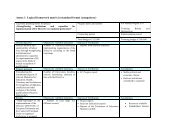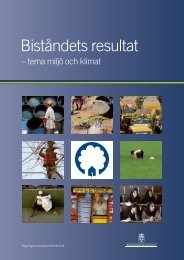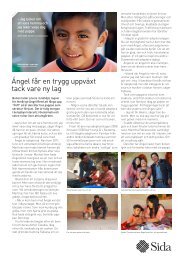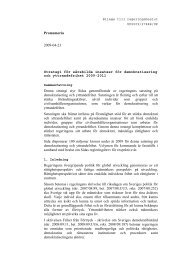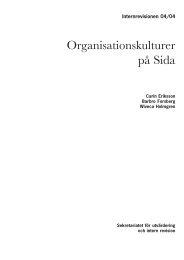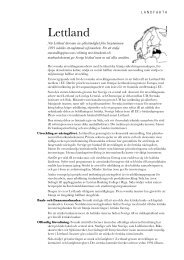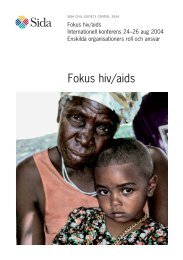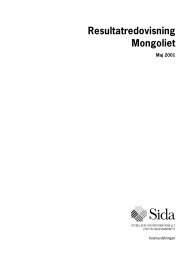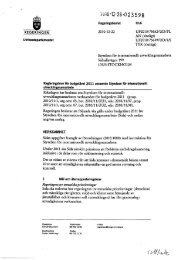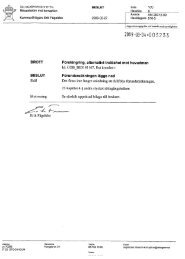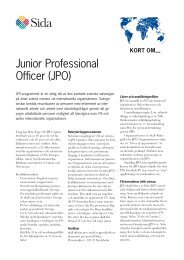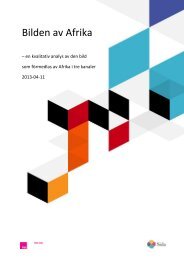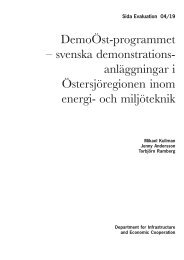Mid-Term Review of the AGIR Programme - Sida
Mid-Term Review of the AGIR Programme - Sida
Mid-Term Review of the AGIR Programme - Sida
You also want an ePaper? Increase the reach of your titles
YUMPU automatically turns print PDFs into web optimized ePapers that Google loves.
E X E C U T I V E S U M M A R Y<br />
The major conclusions <strong>of</strong> <strong>the</strong> mid-term review are:<br />
The <strong>AGIR</strong> programme is highly relevant to national priorities concerned with<br />
an active and engaged civil society. The streng<strong>the</strong>ning <strong>of</strong> civil society is necessary<br />
in an environment where improvements to service delivery, transparency<br />
concerns, and measures <strong>of</strong> accountability are constantly challenged by <strong>the</strong><br />
government and, increasingly, <strong>the</strong> private sector (primarily <strong>the</strong> natural resource<br />
sector). The CSOs (Civil Society Organisations) that <strong>the</strong> <strong>AGIR</strong> programme<br />
has partnered with have attempted to fill this void and add strength to<br />
<strong>the</strong> voice <strong>of</strong> civil society. The <strong>AGIR</strong> programme has done well in attracting<br />
and working with a large group <strong>of</strong> CSOs that work with <strong>the</strong> <strong>the</strong>mes consistent<br />
with <strong>the</strong> programme’s overall focus.<br />
While <strong>the</strong> <strong>AGIR</strong> programme continues to have low visibility as a programme<br />
among o<strong>the</strong>r donors, civil society organisations and <strong>the</strong> Mozambican government,<br />
those who do know <strong>of</strong> it have a high degree <strong>of</strong> praise for its innovative<br />
approach and focus for support to civil society.<br />
Within <strong>the</strong> <strong>AGIR</strong> programme <strong>the</strong>re has been exemplary application <strong>of</strong> <strong>the</strong><br />
Good Donorship principles, which have been enthusiastically supported by<br />
<strong>the</strong> participating CSOs. While it is still early in <strong>the</strong> programme’s life, <strong>the</strong> outcomes<br />
<strong>of</strong> this approach seem to have begun to produce results in <strong>the</strong> level and<br />
focus <strong>of</strong> competency in <strong>the</strong> affiliated CSOs. The principle <strong>of</strong> good donorship<br />
has, however, posed a challenge to <strong>the</strong> consistency <strong>of</strong> <strong>the</strong> <strong>AGIR</strong> programme<br />
between intermediaries and in <strong>the</strong> relationships between intermediaries and<br />
<strong>the</strong>ir CSO partners. The process <strong>of</strong> identifying high-level objectives for <strong>the</strong><br />
programme, and <strong>the</strong> meeting <strong>of</strong> <strong>the</strong>se objectivesin <strong>the</strong> field by <strong>the</strong> CSOs, can<br />
be problematic when implementation planning and strategies are based on <strong>the</strong><br />
workplans <strong>of</strong> <strong>the</strong> CSOs. It was not clear to <strong>the</strong> evaluation team how <strong>the</strong> programme<br />
will ensure that, under core funding, <strong>the</strong> partner organisations will<br />
necessarily implement <strong>AGIR</strong> activities, and to what extent it avoids <strong>the</strong> risk <strong>of</strong><br />
<strong>the</strong> organisations implementing o<strong>the</strong>r activities.<br />
Currently, <strong>the</strong>re are 43 CSOs involved in <strong>the</strong> <strong>AGIR</strong> programme (it has surpassed<br />
<strong>the</strong> goal <strong>of</strong> 39 by 2014). This set <strong>of</strong> partners allows <strong>the</strong> programme to<br />
cover <strong>the</strong> wide array <strong>of</strong> activities <strong>of</strong> <strong>the</strong> four sub-programmes. Geographically,<br />
<strong>AGIR</strong> covers all provinces and districts through direct partners and <strong>AGIR</strong><br />
CSO partner’s branches. While <strong>the</strong> vast majority <strong>of</strong> direct <strong>AGIR</strong> partners are<br />
central level organisations, local direct strategic <strong>AGIR</strong> partners have been recruited<br />
(especially in 2012) in <strong>the</strong> central and nor<strong>the</strong>rn parts <strong>of</strong> <strong>the</strong> country to<br />
reinforce horizontal linkages at <strong>the</strong> local level and expand programme impact<br />
and long-term sustainability. None<strong>the</strong>less, <strong>the</strong> current portfolio still falls short<br />
<strong>of</strong> covering all <strong>the</strong> planned interventions. The freezing <strong>of</strong> funding <strong>of</strong> some<br />
partners after management problems has left some gaps in <strong>the</strong> coverage <strong>of</strong> activities.<br />
Intermediaries state that this has been <strong>of</strong>fset by <strong>the</strong> integration <strong>of</strong> new<br />
partners.<br />
<strong>AGIR</strong> programme coordination by <strong>the</strong> intermediary organisations is improving<br />
through <strong>the</strong> focused use <strong>of</strong> <strong>the</strong> ICC (Intermediaries Coordination Committee)<br />
and technical groups. <strong>AGIR</strong> is conceived as a programme, but its opera-<br />
7



